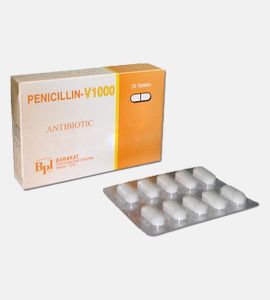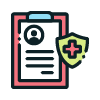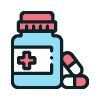Buy Penicillin without prescription

Buy Penicillin without a prescription online isn’t difficult? Don’t worry, with us you can buy Ampicillin online without any hassle and quickly.
Brand(s): Ampicillin
Buy Penicillin Without Prescription
Do you want to buy Penicillin online? On this page you can see where you can order this medicine without a prescription previously obtained from your own doctor. Safe, reliable and discreet. This drug belongs to an antibiotics medications to treat respiratory infections and ear infections and is considered safe by several doctors to order online. Do you want to know more? Then check the frequently asked questions, how to buy Penicillin with no prescription or check all the prices of this medicine.
Order Penicillin Without Prescription Prices
In the following table you can see where you can order Ampicillin without using prescription, reviewers from 2-pharmaceuticals.com have checked all the prices on the internet and came to the conclusion that pharmacy-shop-norx delivers the best Penicillin prices without a prescription being needed. They ship worldwide (Not to USA/Canada), their stocks are located both within EU and overseas, and they provide excellent service for buying Penicillin with no prescription.
What is Penicillin
Penicillin is an irregular antipsychotic medicine. Blocks dopamine receptors of CNS as well as conflicts dopamine button in basic gangliya as well as in limbic a component of neoncephalon. It is taken at Hypersensitivity, disorders of hemopoietic system (along with in anamnesis), alcoholic as well as harmful psychosis, myasthenia, comas.
Penicillin Drug Uses
Penicillins are used to treat infections caused by bacteria. They work by killing the bacteria or preventing their growth. There are several different kinds of penicillins. Each is used to treat different kinds of infections. One kind of Ampicillin usually may not be used in place of another. In addition, penicillins are used to treat bacterial infections in many different parts of the body. They are sometimes given with other antibacterial medicines (antibiotics). Some of the penicillins may also be used for other problems as determined by your doctor. However, none of the amplicin will work for colds, flu, or other virus infections.
What Should You Discuss To Your Doctor Before Using This Product
- Before using this medication, tell your doctor or pharmacist if you are allergic to it; or to other antibiotics (such as other penicillins, cephalosporins); or if you have any other allergies. This product may contain inactive ingredients, which can cause allergic reactions or other problems. Talk to your pharmacist for more details.
- Before using this medication, tell your doctor or pharmacist your medical history, especially of: kidney disease.
- This medication may cause live bacterial vaccines (such as typhoid vaccine) to not work as well. Do not have any immunizations/vaccinations while using this medication unless your doctor tells you to.
- Before having surgery, tell your doctor or dentist about all the products you use (including prescription drugs, nonprescription drugs, and herbal products).
- During pregnancy, this medication should be used only when clearly needed. Discuss the risks and benefits with your doctor.
Penicillin Drug Interactions
Although certain medicines should not be used together at all, in other cases two different medicines may be used together even if an interaction might occur. In these cases, your doctor may want to change the dose, or other precautions may be necessary. When you are taking any of these medicines, it is especially important that your healthcare professional know if you are taking any of the medicines listed below. The following interactions have been selected on the basis of their potential significance and are not necessarily all-inclusive.
Using medicines in this class with any of the following medicines is usually not recommended, but may be required in some cases. If both medicines are prescribed together, your doctor may change the dose or how often you use one or both of the medicines.
- Alfentanil
- Amifampridine
- Amiodarone
- Avapritinib
- Axitinib
- Benzhydrocodone
- Brigatinib
- Buprenorphine
- Bupropion
- Capmatinib
- Chlortetracycline
- Cholera Vaccine, Live
- Clarithromycin
- Codeine
Other Interactions
Certain medicines should not be used at or around the time of eating food or eating certain types of food since interactions may occur. Using alcohol or tobacco with certain medicines may also cause interactions to occur. Discuss with your healthcare professional the use of your medicine with food, alcohol, or tobacco.
Other Medical Problems of Ampicillin
The presence of other medical problems may affect the use of medicines in this class. Make sure you tell your doctor if you have any other medical problems, especially:
- Allergy, general (such as asthma, eczema, hay fever, hives), history of: Patients with a history of general allergies may be more likely to have a severe reaction to penicillins
- Bleeding problems, history of: Patients with a history of bleeding problems may be more likely to have bleeding when receiving carbenicillin, piperacillin, or ticarcillin
- Congestive heart failure (CHF)
- High blood pressure: Large doses of carbenicillin or ticarcillin may make these conditions worse, because these medicines contain a large amount of salt
- Cystic fibrosis: Patients with cystic fibrosis may have an increased chance of fever and skin rash when receiving piperacillin
- Kidney disease: Patients with kidney disease may have an increased chance of side effects
- Mononucleosis (”mono”): Patients with mononucleosis may have an increased chance of skin rash when receiving ampicillin, bacampicillin, or pivampicillin
- Phenylketonuria: Some strengths of the amoxicillin chewable tablets contain aspartame, which is changed by the body to phenylalanine, a substance that is harmful to patients with phenylketonuria.
- Stomach or intestinal disease, history of (especially colitis, including colitis caused by antibiotics): Patients with a history of stomach or intestinal disease may be more likely to develop colitis while taking penicillins
Proper Usage of Penicillin
Penicillins (except bacampicillin tablets, amoxicillin, penicillin V, pivampicillin, and pivmecillinam) are best taken with a full glass (8 ounces) of water on an empty stomach (either 1 hour before or 2 hours after meals) unless otherwise directed by your doctor.
For patients taking amoxicillin, penicillin V, pivampicillin, and pivmecillinam:
- Amoxicillin, penicillin V, pivampicillin, and pivmecillinam may be taken on a full or empty stomach.
- The liquid form of amoxicillin may also be taken by itself or mixed with formulas, milk, fruit juice, water, ginger ale, or other cold drinks. If mixed with other liquids, take immediately after mixing. Be sure to drink all the liquid to get the full dose of medicine.
For patients taking bacampicillin:
- The liquid form of this medicine is best taken with a full glass (8 ounces) of water on an empty stomach (either 1 hour before or 2 hours after meals) unless otherwise directed by your doctor.
- The tablet form of this medicine may be taken on a full or empty stomach.
For patients taking Ampicillin G by mouth:
- Do not drink acidic fruit juices (for example, orange or grapefruit juice) or other acidic beverages within 1 hour of taking penicillin G since this may keep the medicine from working properly.
For patients taking the oral liquid form of penicillins:
- This medicine is to be taken by mouth even if it comes in a dropper bottle. If this medicine does not come in a dropper bottle, use a specially marked measuring spoon or other device to measure each dose accurately. The average household teaspoon may not hold the right amount of liquid.
- Do not use after the expiration date on the label. The medicine may not work properly after that date. If you have any questions about this, check with your pharmacist.
For patients taking the chewable tablet form of amoxicillin:
- Tablets should be chewed or crushed before they are swallowed.
To help clear up your infection completely, keep taking this medicine for the full time of treatment, even if you begin to feel better after a few days. If you have a ”strep” infection, you should keep taking this medicine for at least 10 days. This is especially important in ”strep” infections. Serious heart problems could develop later if your infection is not cleared up completely. Also, if you stop taking this medicine too soon, your symptoms may return.
This medicine works best when there is a constant amount in the blood or urine. To help keep the amount constant, do not miss any doses. Also, it is best to take the doses at evenly spaced times, day and night . For example, if you are to take four doses a day, the doses should be spaced about 6 hours apart. If this interferes with your sleep or other daily activities, or if you need help in planning the best times to take your medicine, check with your health care professional.
Make certain your health care professional knows if you are on a low-sodium (low-salt) diet. Some of these medicines contain enough sodium to cause problems in some people.
Penicillin Dosage
The dose medicines in this class will be different for different patients. Follow your doctor’s orders or the directions on the label. The following information includes only the average doses of these medicines. If your dose is different, do not change it unless your doctor tells you to do so.
The amount of medicine that you take depends on the strength of the medicine. Also, the number of doses you take each day, the time allowed between doses, and the length of time you take the medicine depend on the medical problem for which you are using the medicine.
The number of tablets or teaspoonfuls of suspension that you take depends on the strength of the medicine. Also, the number of doses you take each day, the time allowed between doses, and the length of time you take the medicine depend on the medical problem for which you are taking a penicillin.
- For Amoxicillin Ampicillin :
- For bacterial infections:
- For oral dosage forms (capsules, oral suspension, tablets, and chewable tablets):
- Adults, teenagers, and children weighing more than 40 kilograms (kg) (88 pounds): 250 to 500 milligrams (mg) every eight hours or 500 to 875 mg every twelve hours, depending on the type and severity of the infection.
- Neonates and infants up to 3 months of age: Dose is based on body weight and must be determined by your doctor. The usual dose is 15 mg per kg (6.8 mg per pound) of body weight or less every twelve hours.
- Infants 3 months of age and older and children weighing up to 40 kg (88 lbs.): Dose is based on body weight and must be determined by your doctor. The usual dose is 6.7 to 13.3 mg per kg (3 to 6 mg per pound) of body weight every eight hours or 12.5 to 22.5 mg per kg (5.7 to 10.2 mg per pound) of body weight every twelve hours.
- For duodenal ulcers (associated with Helicobacter pylori bacterial infection):
- For oral dosage forms (capsules, oral suspension, tablets, and chewable tablets):
- Adults: 1000 mg twice a day every twelve hours for fourteen days, along with the two other medicines, clarithromycin and lansoprazole, as directed by your doctor.
- Teenagers and children: Use and dose must be determined by your doctor.
- For dual medicine therapy:
- Adults: 1000 mg three times a day every eight hours for fourteen days, along with the other medicine, lansoprazole, as directed by your doctor.
- Teenagers and children: Use and dose must be determined by your doctor.
- For dual medicine therapy:
- For oral dosage forms (capsules, oral suspension, tablets, and chewable tablets):
- For duodenal ulcers (associated with Helicobacter pylori bacterial infection):
- For oral dosage forms (capsules, oral suspension, tablets, and chewable tablets):
- For bacterial infections:
- For penicillin G:
- For bacterial infections:
- For oral dosage form (oral solution, oral suspension, and tablets):
- Adults and teenagers: 200,000 to 500,000 Units (125 to 312 milligrams [mg]) every four to six hours.
- Infants and children less than 12 years of age: Dose is based on body weight and must be determined by your doctor. The usual dose is 4167 to 30,000 Units per kilogram (kg) (189 to 13,636 Units per pound) of body weight every four to eight hours.
- For benzathine injection dosage form:
- Adults and teenagers: 1,200,000 to 2,400,000 Units injected into a muscle as a single dose.
- Infants and children: 300,000 to 1,200,000 Units injected into a muscle as a single dose; or 50,000 Units per kg (22,727 Units per pound) of body weight injected into a muscle as a single dose.
- For injection dosage forms (potassium and sodium salts):
- Adults and teenagers: 1,000,000 to 5,000,000 Units, injected into a vein or muscle every four to six hours.
- Older infants and children: Dose is based on body weight and must be determined by your doctor. The usual dose is 8333 to 25,000 Units per kg (3788 to 11,363 Units per pound) of body weight, injected into a vein or muscle every four to six hours.
- Premature infants and newborns: Dose is based on body weight and must be determined by your doctor. The usual dose is 30,000 Units per kg (13,636 Units per pound) of body weight, injected into a vein or muscle every twelve hours.
- For procaine injection dosage form:
- Adults and teenagers: 600,000 to 1,200,000 Units injected into a muscle once a day.
- Children: Dose is based on body weight and must be determined by your doctor. The usual dose is 50,000 Units per kg (22,727 Units per pound) of body weight, injected into a muscle once a day.
- For procaine injection dosage form:
- For injection dosage forms (potassium and sodium salts):
- For benzathine injection dosage form:
- For oral dosage form (oral solution, oral suspension, and tablets):
- For bacterial infections:
- For penicillin V:
- For bacterial infections:
- For the benzathine salt oral dosage form (oral solution):
- Adults and teenagers: 200,000 to 500,000 Units every six to eight hours.
- Children: 100,000 to 250,000 Units every six to eight hours.
- For the potassium salt oral dosage forms (oral solution, oral suspension, and tablets):
- Adults and teenagers: 125 to 500 milligrams (mg) every six to eight hours.
- Children: Dose is based on body weight and must be determined by your doctor. The usual dose is 2.5 to 16.7 mg per kilogram (kg) (1.1 to 7.6 mg per pound) of body weight every four to eight hours.
- For the potassium salt oral dosage forms (oral solution, oral suspension, and tablets):
- For the benzathine salt oral dosage form (oral solution):
- For bacterial infections:
Missed Dosage
If you miss a dose of this medicine, take it as soon as possible. However, if it is almost time for your next dose, skip the missed dose and go back to your regular dosing schedule. Do not double doses.
Penicillin Storage
- Store the medicine in a closed container at room temperature, away from heat, moisture, and direct light. Keep from freezing.
- Keep out of the reach of children.
- Do not keep outdated medicine or medicine no longer needed.
Penicillin Precautions
If your symptoms do not improve within a few days, or if they become worse, check with your doctor.
Ampicillin may cause diarrhea in some patients.
- Check with your doctor if severe diarrhea occurs. Severe diarrhea may be a sign of a serious side effect. Do not take any diarrhea medicine without first checking with your doctor. Diarrhea medicines may make your diarrhea worse or make it last longer.
- For mild diarrhea, diarrhea medicine containing kaolin or attapulgite (e.g., Kaopectate tablets, Diasorb) may be taken. However, other kinds of diarrhea medicine should not be taken. They may make your diarrhea worse or make it last longer.
- If you have any questions about this or if mild diarrhea continues or gets worse, check with your health care professional.
Oral contraceptives (birth control pills) containing estrogen may not work properly if you take them while you are taking ampicillin, amoxicillin, or penicillin V. Unplanned pregnancies may occur. You should use a different or additional means of birth control while you are taking any of these penicillins. If you have any questions about this, check with your health care professional.
For diabetic patients:
- Penicillins may cause false test results with some urine sugar tests. Check with your doctor before changing your diet or the dosage of your diabetes medicine.
Before you have any medical tests, tell the doctor in charge that you are taking this medicine. The results of some tests may be affected by this medicine.
Penicillin Side Effects
Along with its needed effects, a medicine may cause some unwanted effects. Although not all of these side effects may occur, if they do occur they may need medical attention. Stop taking this medicine and get emergency help immediately if any of the following effects occur:
- Fast or irregular breathing
- fever
- joint pain
- lightheadedness or fainting (sudden)
- puffiness or swelling around the face
- red, scaly skin
- shortness of breath
- skin rash, hives, itching
Other negative effects not listed can also happen in some sufferers. If you discover some other results, verify along with your healthcare skilled. Call your physician for medical recommendation about negative effects.
Disclaimer
Information concerning psychotic disorders, included within the review of Penicillin, is used for the informative features exclusively as well as should not be thought-about to alternative to licensed healthcare or referral of the well being treatment distributor.

⚠Disclaimer of liability
Pfizer is not affiliated with this site. The brand name and logos and images used are the property of Pfizer. The content of this site is for informational purposes only. We do not supply, market or ship medicines ourselves and refer you to reputable web stores on the Internet. Always consult a physician when using medicines.
On this website we do not sell any medications and refer visitors to trusted Internet providers. In this way, we save you and the best price to people many problems and you can easily and legally obtain this powerful medicine.

℞ Frequently asked questions
What is Penicillin?
Penicillins are useful against infections in many parts of the body, including the mouth and throat, skin and soft tissue, tonsils, heart, lungs, and ears.
What to do if you miss a dose?
If you miss a dose of Ampicillin, take it as quickly as potential. However, whether it is virtually time to your subsequent dose, skip the missed dose and return to your common dosing schedule. Do not double doses.
What if u take too much Penicillin?
If an overdose happens name your physician or 911. You might have pressing medical care. You might also contact the poison management at your local hospital
How to store Penicillin?
Store at room temperature between 59-77 degrees F (15-25 degrees C) away from light and moisture, kids and pets.
What Should I Avoid While Taking Ampicillin?
Avoid consuming alcohol or utilizing unlawful medicine when you are taking Benzac. They might lower the advantages (e.g. worsen your confusion) and improve hostile results (e.g. sedation) of the remedy.
What are the side effects of Penicillin?
Most common side effects may include: diarrhea, headache, sore mouth or tongue, vaginal itching and discharge and white patches in the mouth and/or on the tongue.
℡ How to buy Penicillin without subscription online?
Time Needed : 00 days 00 hours 05 minutes
How to buy Ampicillin without a prescription within 5 minutes
- Read all the important information about the medicine.
It’s very important to do good research on Penicillin, look in our guide to read about all the important subjects. Look at all the different types of Penicillin here.
- Look at the prices of Penicillin in one of our tables at this page.
After you did your initial research, we advice you to compare and look at all the prices of Penicillin. Look at all the different type of available dosages here.
- Buy Penicillin with no prescription in 5 minutes in a trustworthy webshop.
Choose one of the best suppliers of Penicillin without prescription and receive your product within 3-5 working days. Look at all the different types of medicines here.
Last Updated on October 29, 2021 by Toni El Clikos



